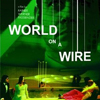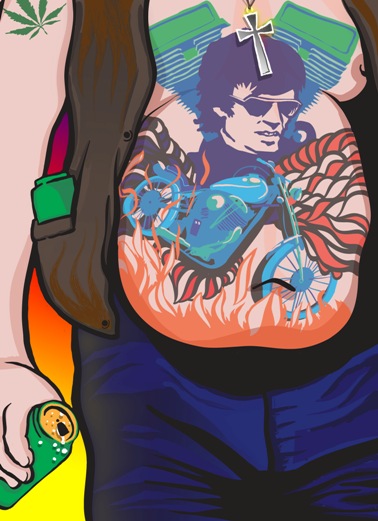April 12, 2011
As well as writing regular reviews for Shiny Shelf and Electric Sheep magazines, writing features and commissioning comic strips for the latter and transcribing interviews for Wheel Me Out Magazine, Alex Fitch has contributed to four anthologies published in 2010 / 11.
The first of these – Directory of World Cinema: American Independent – went online in March and the book went on sale in May 2010.
 You can also download or read the book online (though Alex would prefer if you bought a copy – see below).
You can also download or read the book online (though Alex would prefer if you bought a copy – see below).
Here’re some extracts:
On director Stuart Gordon: “Gordon took advice from his mother when making science fiction: if you don’t have the budget to make it expensive, you should make it smart, and Fortress evokes a convincing futuristic world outside its subterranean walls.”
On Horror films: “Worldwide cultural and political liberation in the 1960s led to more extreme forms of art becoming acceptable within mainstream media, although there was still the occasional movie that relied on atmosphere for audience chills rather than entrails.”
Also includes Alex’s reviews of Halloween (1979), House of 1,000 Corpses, The Devil’s Rejects, The Sticky fingers of time, Super-size me, Shortbus, Society and Mala Noche. More info at www.intellectbooks.co.uk
Launched at the British International Comics Show in October 2010:
 A new anthology of horror and genre comics by new creators whose original home for these strips – Insomnia Publication – ceased trading before publication, leading to this handsomely produced self published anthology.
A new anthology of horror and genre comics by new creators whose original home for these strips – Insomnia Publication – ceased trading before publication, leading to this handsomely produced self published anthology.
The book contains a foreword by Alex Fitch; here’s an extract:
The Sleepless Phoenix: Survival Stories is mainly based around the horror genre with a handful of detours into war and science-fiction, which possibly reflects the popularities of those genres in general at the moment – TV & bookshelves are filled with vampire tales, while the big screen is full of remakes, reimaginings & rip offs of slasher films. Here, while there is a certain familiarity with certain tropes of scary stories, there are plenty of twists on reliable and shocking subjects to make the contents within both familiar and new…
The third of 2010’s anthologies includes a transcript of Alex Fitch’s interview with Michael Winterbottom about his film Code 46 in a book titled:
 Michael Winterbottom: Interviews published by University Press of Mississippi in December. You can stream the interview at Sci-Fi London and download the mp3 here.
Michael Winterbottom: Interviews published by University Press of Mississippi in December. You can stream the interview at Sci-Fi London and download the mp3 here.
Here’s an extract:
MW:At one point, as a joke, we were going to do this big pseudo-scientific document about all the science that we’d drawn on to make our film because Minority Report was completely based on that ludicrous gadget/gimmick thing. For us, it was a question of looking at the way societies work now in different places, taking some of the issues like genetics and refugees and just move one step away from that. In the opposite sort of film, it’s great to watch something like Alphaville and just pan across a random skyline of Paris and that is the future. It’s as realistic a vision of the future as you’re going to get.
The first of 2011’s anthologies to feature writing by Alex Fitch is The End: An Electric Sheep Anthology (Strange Attractor Press, £13.99):
 … the first book by Electric Sheep Magazine, featuring all new articles by regular creators. Alex has contributed the script of a visual essay on zombie films post Night of the Living Dead (1968) and interviews with directors Michael Almereyda and Vincenzo Natali for a feature on film-makers’ favourite final scenes.
… the first book by Electric Sheep Magazine, featuring all new articles by regular creators. Alex has contributed the script of a visual essay on zombie films post Night of the Living Dead (1968) and interviews with directors Michael Almereyda and Vincenzo Natali for a feature on film-makers’ favourite final scenes.
Here’re some extracts:
With Dawn of the dead in 1978, the zombie apocalypse is now fully under way: fleeing the outbreak, four survivors lead by another charismatic black hero end up holed up in a mall. No explanation is given for the apocalypse in the film; it simply presents zombies as brain-dead consumers shuffling about the building, snacking on human flesh between bouts of window shopping.
Michael Almereyda: (The Searchers) is a very American film, but it’s also a film that acknowledges and reels from these huge questions of genocide and race . It’s in some ways an ugly film – the ground is really smoking in that film, it’s not a pretty picture.
Vincenzo Natali: There are many things that are extraordinary about the ending of Se7en (1995). First and foremost, the entire film leads to that last and final moment. It’s like a Swiss watch, it’s perfectly constructed to bring us to that inevitable conclusion…
You can order Michael Winterbottom: Interviews (Conversations with Filmmakers) / Directory of World Cinema: American Independent volume 1
/ Directory of World Cinema: American Independent volume 1 from amazon.co.uk and The End: An Electric Sheep Anthology from Strange Attractor Press. A product ordering page for The Sleepless Phoenix: Survival Stories will be available on their website soon.
from amazon.co.uk and The End: An Electric Sheep Anthology from Strange Attractor Press. A product ordering page for The Sleepless Phoenix: Survival Stories will be available on their website soon.


















































































 A text only interview for a change – I may get Phil to read it out for the next ES podcast – between Alex Fitch and acclaimed animé director Makoto Shinkai (The Place Promised in Our Early Days, Voices of a Distant Star) is online now at
A text only interview for a change – I may get Phil to read it out for the next ES podcast – between Alex Fitch and acclaimed animé director Makoto Shinkai (The Place Promised in Our Early Days, Voices of a Distant Star) is online now at
You must be logged in to post a comment.